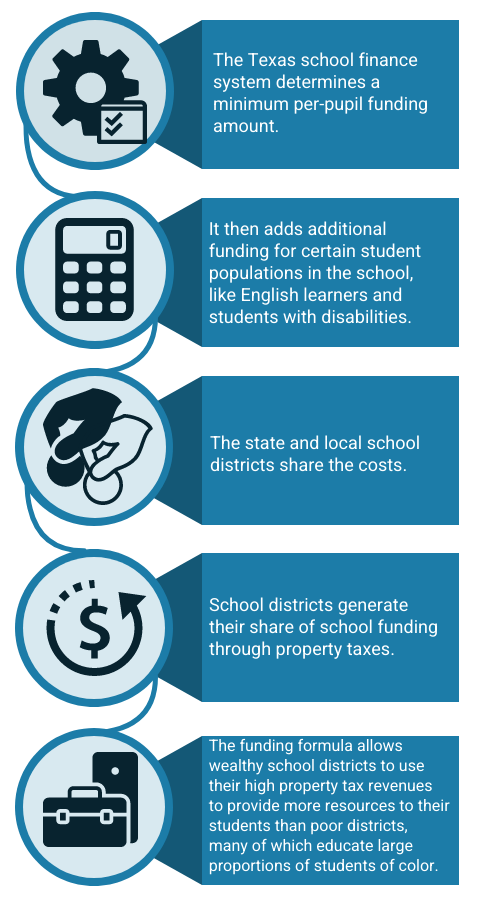Every public school should have the resources it needs to provide an excellent education to all students, including English learners and students in families with low incomes. To do this, the state should fund all public schools adequately and equitably. However, schools in Texas have struggled to get fair funding for decades.
What makes funding unfair?
 Despite changes to public education funding in 2019 through House Bill 3 (HB 3), many funding inequities remain in Texas, including the following.
Despite changes to public education funding in 2019 through House Bill 3 (HB 3), many funding inequities remain in Texas, including the following.
![]() Student-based funding that is still too low. Student-based weights generate additional funding for special student populations, including English learners, students with disabilities, and students from “economically disadvantaged” families. Recent changes to the school finance system adjusted some of these weights, but many remain too low to sufficiently fund schools to meet students’ needs (Craven, 2020; Cárdenas, 1997).
Student-based funding that is still too low. Student-based weights generate additional funding for special student populations, including English learners, students with disabilities, and students from “economically disadvantaged” families. Recent changes to the school finance system adjusted some of these weights, but many remain too low to sufficiently fund schools to meet students’ needs (Craven, 2020; Cárdenas, 1997).
![]() There is still an imbalance between high-property wealth and low-property wealth districts. HB 3 created a new system of tax compression, combining statewide compression with district-by-district property tax compression. It also requires districts to reduce their property tax rates if the revenue they generate from those taxes will increase by more than 2.5% in any given year. Allowing district-by-district compression increases inequity in the school finance system. High-property wealth school districts can tax residents at lower rates, while low-property wealth school districts will have to tax at higher rates to get the same funding (Craven, 2019).
There is still an imbalance between high-property wealth and low-property wealth districts. HB 3 created a new system of tax compression, combining statewide compression with district-by-district property tax compression. It also requires districts to reduce their property tax rates if the revenue they generate from those taxes will increase by more than 2.5% in any given year. Allowing district-by-district compression increases inequity in the school finance system. High-property wealth school districts can tax residents at lower rates, while low-property wealth school districts will have to tax at higher rates to get the same funding (Craven, 2019).
![]() Inequities divert funding from the students who need it most. Texas funding formulae do not ensure that funds are equitably targeted. For example, HB 3 created new allotments for early education and college, career and military readiness. But those funds are not fairly targeted to meet the needs of all students and schools and may actually provide the most benefit to schools that already have successful programs.
Inequities divert funding from the students who need it most. Texas funding formulae do not ensure that funds are equitably targeted. For example, HB 3 created new allotments for early education and college, career and military readiness. But those funds are not fairly targeted to meet the needs of all students and schools and may actually provide the most benefit to schools that already have successful programs.
Inequitable Funding Hurts Texas Students
Unfair funding in the classroom for English learners, students from families with limited incomes, and other student groups means fewer educational resources for needed programs, up-to-date technology and equipment, and sufficient teaching support. Unfair funding in Texas continues to benefit wealthier neighborhoods and can violate the civil rights of students of color, students from families with limited incomes, and English learners to receive high-quality public education (IDRA, 2019).
Policy Recommendations for Texas
The Texas Legislature should…
- Fund public schools based on the promises of House Bill 3 made during the last session.
- Revise the property tax changes in HB 3 to make similar local tax effort result in similar levels of funding for schools.
- Remove the tax rate cap from 2019 and protect sources of tax revenue that fund public schools. Also establish new funding streams to alleviate property tax pressures and assist school district COVID-19 responses.
- Avoid cuts to education by leveraging existing and new sources of state revenue and extending hold harmless provisions through spring 2021.
- Work with the federal government for additional, supplemental stimulus money to go to schools.
- Prioritize funds for education programs that serve students most impacted by the pandemic and historically marginalized in schools: emergent bilingual students (English learners), students receiving special education services, and students from low-income households.
Legislators and state education officials should…
- Ensure the Texas Education Agency’s decisions are subject to democratic, data-driven evaluation processes.
For more information, contact Dr. Chloe Latham Sikes, IDRA Deputy Director of Policy (chloe.sikes@idra.org) or Ana Ramón, IDRA Deputy Director of Advocacy (ana.ramon@idra.org).
References
Cárdenas, J.A. (1997). Texas School Finance Reform: An IDRA Perspective. San Antonio, Texas: IDRA.
Craven, M. (June-July 2019). Texas Legislature Concentrates on School Funding. IDRA Newsletter.
IDRA. (2019). 7 things to ensure school finance equity in Texas, Infographic. San Antonio, Texas: IDRA.
IDRA. (2016). Principles for Fair Funding for the Common Good. San Antonio, Texas: IDRA.

